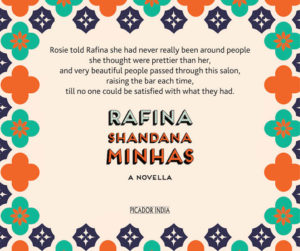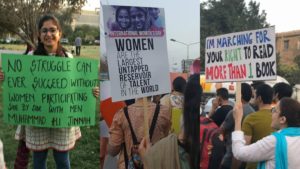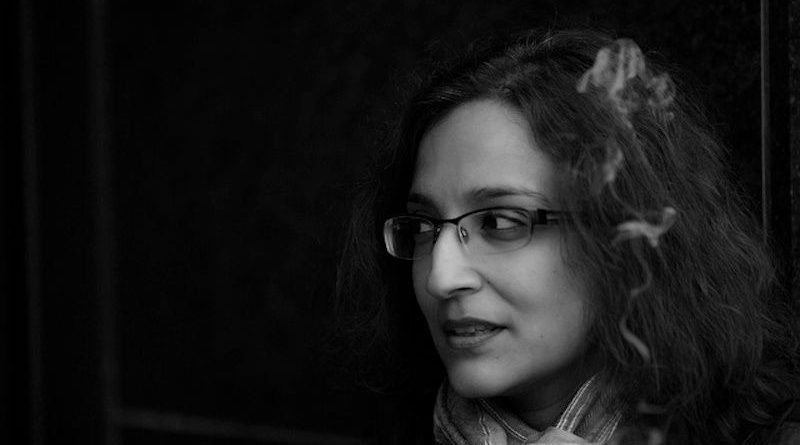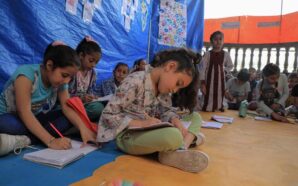Shandana Minhas – I remember a vibrant young woman who I had the privilege of working with perhaps eons ago… or so it seems. Walking down memory lane, I remember immediately hitting it off… chatting with her was always a masterclass in learning. Her charm and exuberance so infectious and endearing, her compelling thoughts and perceptive observations always left me in awe. But then life happened and we lost touch. Fast forward 2017 and thanks to the parallel reality we now live in, I found one of my favourite Pakistani storytellers and an old friend on Facebook. Shandana once again reminded me of her integrity and vigour as a writer, her quick wit and inspiring vision.
Garnering worldwide recognition, in 2007, Shandana wrote her very first novel Tunnel Vision, which is a first-person meditation on life as a woman in a man’s world – a highly relevant topic in today’s climate of fervently empowering global women marches, eye-opening TimesUp and MeToo campaigns.
Tunnel Vision was shortlisted for the Commonwealth Writer’s Prize and even adapted for stage by The Madras Players in 2009. It was later published in Italian as Pakistan Graffiti in 2012. The novel was followed by another critically acclaimed, ‘bitingly fun’ adventure novel, Survival Tips for Lunatics (2014) and Daddy’s Boy (2016). In 2016, Shandana also launched Mongrel Books in the southern city of Karachi – Pakistan.
 Her latest work is a novella, Rafina, which has already been adapted for screen with the lead being played by the effervescent Pakistani actor Amna Ilyas (pre-order now). Here is an excerpt from the novella to pique our readers’ interest: “Rafina looks at the glamorous girl on the billboard outside her window in Karachi and thinks, it won’t be long before I’m up there. Too poor for college and dismissive of marriage, the clear-eyed young woman cajoles her mother’s friend and Radiance beauty parlour masseuse, Rosie khala, into taking her on as an apprentice. Thus begin her brave misadventures – from clumsy parlour assistant, to mostly dependable tea girl, till in a stroke of serendipity, she is ‘discovered’.
Her latest work is a novella, Rafina, which has already been adapted for screen with the lead being played by the effervescent Pakistani actor Amna Ilyas (pre-order now). Here is an excerpt from the novella to pique our readers’ interest: “Rafina looks at the glamorous girl on the billboard outside her window in Karachi and thinks, it won’t be long before I’m up there. Too poor for college and dismissive of marriage, the clear-eyed young woman cajoles her mother’s friend and Radiance beauty parlour masseuse, Rosie khala, into taking her on as an apprentice. Thus begin her brave misadventures – from clumsy parlour assistant, to mostly dependable tea girl, till in a stroke of serendipity, she is ‘discovered’.
Poised to have everything she thought she wanted, the only thing standing between Rafina and that billboard are the people who think she should still be using the service entrance.?…”
Catching up online with Shandana, I leapt at the opportunity to chat with her exclusively for Ananke about topics and issues close to our hearts: on creative endeavours, feminism, and about her love for the written word. This is how it went…
Tell us about yourself and your creative journey as a writer?
I’ve been telling stories from a very young age, and I have most often used the prose fiction form to do so.
Who or what has influenced you creatively and your writing style?
Everything we come in contact with acts upon us in some way.
What do you think characterizes your writing?
It would be foolish of me to think of my self as a brand, with defined values. I write this sitting on a chair, is that product placement?
What are some of the major themes you choose to write on?
My novels have all featured protagonists who are in some sort of disassociative state. Rafina, the protagonist of this novella, is closest to a disembodied voice. I think most Pakistanis are, in some way. We are taught from infancy to fragment into the public self and the private self, and then further sub-divide according to situation and hierarchy. We are emotionally dismembered, which might be why Pakistanis put so much emphasis on the adhesive of ritual; it holds them together. I think Pakistani women especially have to learn to cultivate a rich inner life, like Rafina does, to avoid being overwhelmed.
Tell us about your latest endeavour – Rafina? Can you tell us something about it – the protagonist and the themes?
Rafina is a story about a girl who dares to dream a better life for herself and her loved ones than the one she is told she must settle for. She is curious, ambitious, a quick learner, attributes she uses to try to overcome the nexus of poverty and class that seeks to keep her in her place. Her plan is to use the beauty industry as a stepping stone to becoming a model. The novella was written at a time when the idea of only fair is lovely was even more deeply entrenched than it is now, and our fashion industry was in its infancy. Now, well connected industry insiders will tell anyone who will listen that “all sorts of people” are in the market, muddying the waters with their entrepreneurship, their talent. Rafina is one of those all sorts of people, yanikay (meaning), more than a hobbyist.
I also chose that setting because the working conditions of the overwhelmingly female work force that makes it possible for more privileged women to look good, are shocking. The beauty and fashion industries in Pakistan continue to be largely unregulated and exploitative in terms of workers rights; I hope Rafina sparks reflection.
 Being a female writer in the sub-continent, you are part of a legacy that boasts names like Quratulain Haider, Ismat Chugtai to the more recent ones including Bapsi Sidhwa, Kamila Shamsi, what does that mean to you?
Being a female writer in the sub-continent, you are part of a legacy that boasts names like Quratulain Haider, Ismat Chugtai to the more recent ones including Bapsi Sidhwa, Kamila Shamsi, what does that mean to you?
It means the opportunity to acknowledge the women who have come before us, so they are not as easily erased as they once were. Apart from the familiar names, there were also the Mastur sisters, Hijab Imtiaz Ali, Khalida Hussain, Rashid Jahan and countless others. I didn’t grow up in a household that was connected in any way to local adab (literature), or to the international chattering classes, so when I read some of these women in translation, as an adult, they were a revelation to me. It was the first time I experienced a sense of belonging, and it rooted me at a time when the fierce anti-intellectualism and sexism of my surroundings was beginning to hurt deeply. This is almost funny, because what I was feeling was the comfort of recognising intergenerational trauma.
There is a new wave of feminism – which is now more pronounced than ever – after a very long time we see women out on the streets marching on, reclaiming public spaces, is the Pakistani woman embracing the feminist ‘label’ as some would say and where do we go from here?
This is a tricky one. Let me start with feminist, and writer. Being called a ‘feminist writer’ is another way for a storyteller to be separated from the herd and make her less palatable to those who perhaps need to read her the most. It’s also becoming a promotional gimmick, a clever bit of positioning for the digital age. If I may choose my own label, I’d say I’m a writer who currently happens to be a feminist.
As for the Pakistani woman, she is not a monolithic identity; do I have the right to speak for her? I can say that, in my opinion, a lot of the women I know remain deeply suspicious of the term and others seem determined to embrace it even though its values do not permeate their life choices. I’d like to think we’re heading towards a more honest conversation between those two polarities. A conversation that includes the elder generation of feminists from this part of the world as well as the youngest.

Shandana Minhas (far right) attending Aurat (Women’s) March in Karachi, Pakistan.
What does feminism mean to you and how does that reflect in your writing?
My fiction is not a grafted extension of my personal beliefs, and writing with a mission is propaganda, even if you think it’s the noblest of missions. That being said, my writing has so far, organically, been planted in antagonisms created by the imbalances intrinsic to feminism’s nemesis, patriarchy. Tunnel Vision’s protagonist quit her first job because of sexual harassment. Survival Tips for Lunatics was set in Balochistan, where armies and their proxies wage a bitter, pointless conflict in which children and women are the invisible victims, Daddy’s Boy was the darkest manifestation so far of my obsession with the way this sorry excuse for a way of life creates broken people, and the way those broken people continue to defend it. I’m fascinated by the idea of responsibility for damage we do when we love those who oppress us, even raise our sons in their image. One of the things that sets Rafina apart, for example, her is relationship with her brother. She won’t indulge him like her mother does. It’s a minor thing but it matters. Because it is in a way my first book – it is being published now but Rafina was written in 2004 – my preoccupations as a writer are just beginning to reveal themselves.
What do you think entails empowerment of the individual and that of society?
I resist the idea of empowerment – which carries connotation of being given, injected – and celebrate the idea of awakening – which is a choice. I think to awaken women, we must awaken their rage, their sense of injustice. Rafina, for instance, is motivated by what she thinks she deserves and not what the world tells her she deserves.
 Being a writer in a society with deeply entrenched patriarchal mindset, gender stereotypes and roles, how do you handle misogyny and sexism?
Being a writer in a society with deeply entrenched patriarchal mindset, gender stereotypes and roles, how do you handle misogyny and sexism?
That has evolved over time. It’s actually quite amusing to think that, when I was younger, I was known as an ‘angry young woman’. I think that actually I was a sad young woman, unaware of her own strength, constantly trying to make herself smaller and less threatening.
But for some years now I have been less keen to avoid causing offense. This has meant the rupture of the closest relationships, which I think is the real cost of being a feminist. If you live your principles instead of merely mouthing them, you are a heretic in the church of the family. Bring your own stake.
I call it out on a professional level more frequently now too. For example, last year the shortlist for the Karachi Literature Festival Getz Pharma Prize for fiction was narrowed to three male competitors, in a field featuring some exceptional work by women and I raised the issue of the erasure of women’s voices. I must note with sadness that, while the KLF did not name the jury before – another questionable practice – and still hasn’t on their site, reliable sources shared that it was one man and two women. I read a Kamla Bhasin quote the other day that began, “Feminism is not biological: feminism is an ideology.” Women as enforcers weaves through Rafina too, how some fight for the crumbs from the table instead of working together to overturn the table. Though Rafina has the counterbalancing example of Rosie khala, and Naz, and the way they lift and support each other, and I’ve been lucky enough to have women in my life who have shown me there is another way of being.
I personally believe the pen is mightier than the sword, so how do (or should) we challenge oppression of the mind?
Oppression of the mind is ultimately self imposed. There is nobody in there with you, you know, you are all your fragmented selves. Embrace them and feed the bravest ones the most.
And of course, read. Read past your life. I think Jeanette Winterson said what I’m trying to say beautifully in her memoir Why Be Happy When You Can Be Normal: “All of us, when in deep trauma, find we hesitate, we stammer; there are long pauses in our speech. The thing is stuck. We get our language back through the language of others. We can turn to the poem. We can open the book. Somebody has been there for us and deep-dived the words.” That is why giving women’s voices the gift of your attention matters.
Can you also tell us about Mongrel Books?
Mongrel Books is a small press my husband and I co-founded in 2016, with the aim of publishing original voices and compelling stories that might not otherwise make it to the local market. Mongrel is about balance, giving as well as taking, about holding the door open so that all kinds of others can come in. Apart from publishing, we’ve started a podcast that we plan to do regularly, and when free thinker Mashal Khan was so brutally murdered on the pretext of blasphemy on a college campus, we mailed random people free books. It was a tiny thing in the fact of such brutality, but we didn’t know what else to do. We knew there were others like us who might be feeling what we were feeling, and it was our way of telling them, you’re not alone. And there isn’t only and always just one story.
There is a more selfish reason too. When I first broached the idea to Imran Yusuf (my husband), I had just had my third child. We were facing certain other pressures as well. He asked me why I wanted to add running a small press to an already explosive mix. I told him, because motherhood can be a dark place, there are invisible storms that buffet women and sometimes sweep them away. Mongrel Books will be a rope for me that I can use to lead me back to my writer self.
You can also book an order at Amazon!
Image credits:
Greg Bal
Aurat March image – Shandana Minhas











